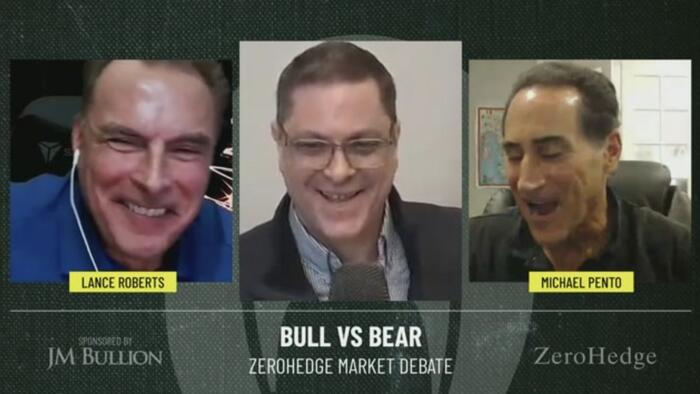The debate over the future of financial markets has intensified, particularly following the recent trends and economic shifts post-Trump’s election win. Initially, many analysts adopted a bullish perspective, buoyed by the expected promise of peace, tax reductions, and favorable regulatory changes. However, dissenting voices have emerged, notably strategist Michael Pento, who foresees a potential market crash as significant as 50% off the S&P 500 index. Recently, Pento engaged in a live debate with Lance Roberts, Chief Investment Strategist at RIA Advisors, during a session organized by ZeroHedge. During this discussion, moderated by Ash Bennington from Real Vision, they explored various aspects of the economic landscape, focusing on key indicators and the implications of Federal Reserve policies.
Roberts underscored fundamental differences between the stock market and credit markets, describing credit markets as grounded in tangible economic assessments like inflation and credit risk. He characterized credit spreads as reliable indicators of impending bear markets and recognized Pento’s concerns regarding the fragile state of the equity market. Despite acknowledging a potential crash, Roberts advised against taking extreme financial positions such as going all-cash or shorting, suggesting instead that investors pay close attention to credit spreads to forecast a downturn accurately. His caution reflects a belief that market dynamics may resist prediction or adherence to historical patterns.
Pento challenges the prevailing belief that the Federal Reserve would act decisively in response to another economic downturn. He highlights significant changes in the economic framework since the pre-COVID era, asserting that the Fed’s traditional methods of intervention, such as zero interest rate policies (ZIRP) and quantitative easing (QE), may no longer be tenable and could lead to detrimental inflation effects. He argues that demographic and economic pressures render the Fed less capable of replicating its previous actions, noting that the balance sheet skyrocketed from $4 trillion to $9 trillion during the pandemic years. The concern over inflation’s resurgence—exceeding levels not seen since the early 1980s—further complicates the Fed’s response capabilities, making aggressive monetary policy unlikely.
Pento further illustrated his argument by citing Japan’s long-standing economic challenges despite extensive central bank interventions. He pointed out that despite having zero percent interest rates and the overwhelming ownership of government bonds by the Bank of Japan, Japanese markets have remained stagnant for decades. This situation serves as a cautionary tale, suggesting that even the most substantial monetary policies might yield limited outcomes. Pento’s view reflects a broader skepticism regarding the efficacy of current central bank strategies, which could struggle in the face of persistent economic headwinds, leading to potentially disastrous consequences for U.S. markets.
In contrast, Roberts criticized the pervasive doomsday narratives that could undermine individual investors. He contended that such predictions might lead many to remain outside the market, missing opportunities for gains, as evidenced by significant recoveries following market dips (like during the 2020 shutdown). He emphasized that, despite the dire projections surrounding various crises, the market has shown remarkable resilience, largely propped up by substantial governmental support measures, including stimulus checks and aggressive monetary policy. Roberts believes that current liquidity levels and governmental backing could keep the market buoyant longer than expected, challenging the forecast stability depending on the alleged proximity of a crash.
Ultimately, both strategists underscore the complexities of accurately diagnosing the imminent risks facing the financial landscape. Pento’s predictions draw attention to vital factors like credit conditions and inflation that could influence market trajectories, while Roberts points to the realities of market liquidity and resilience. The debate highlights a critical intersection of differing methodologies in market analysis: Pento presents a cautious, cautionary forecast grounded in fundamentals and historical precedents, whereas Roberts adopts a more optimistic stance, highlighting market mechanisms and the effects of governmental interventions. Investors are thus left to navigate a divided landscape of viewpoints, each carrying substantial implications for strategic decision-making in the current economic climate.
For those seeking a deeper understanding of this dynamic discourse, the complete debate delves into both strategists’ arguments and interpretations of current market conditions. To access the full discussion and become part of the ongoing dialogue regarding these pivotal economic issues, collaboration with platforms like ZeroHedge offers opportunities for expanded insights and professional perspectives, thereby enabling investors to make informed choices in uncertain times. Additionally, upcoming debates continue to thrive, providing further analysis on crucial topics blending financial analysis with broader societal concerns.

